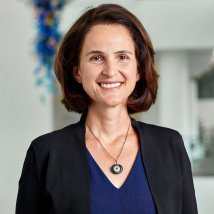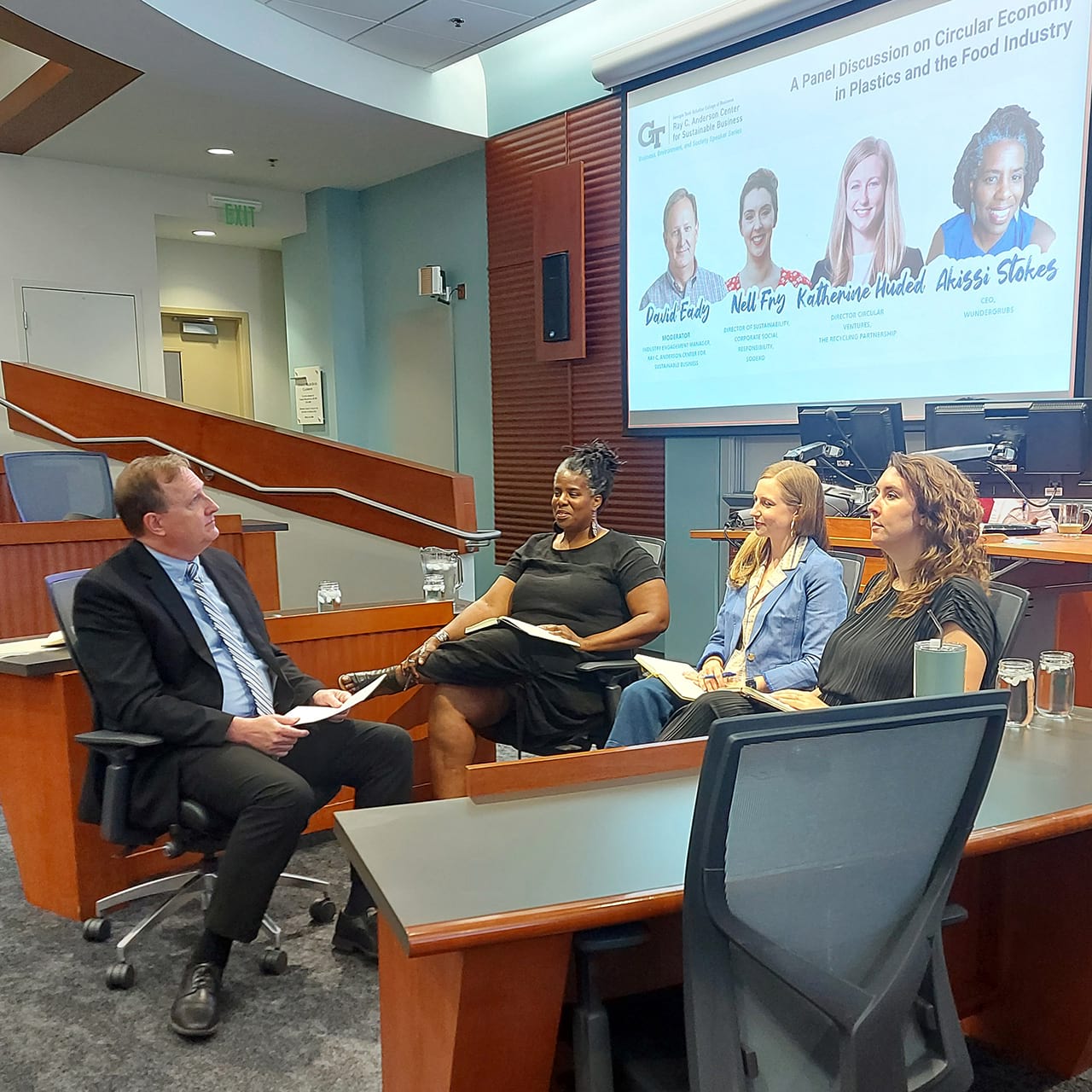The Ray C. Anderson Center for Sustainable Business (“Center”) launched the Business, Environment, and Society Speaker Series in 2016 to develop and strengthen the network of sustainability-minded students, faculty, staff, practitioners, and community members. Hosting the series is just one way in which the Center serves as a connector and catalyst across diverse stakeholders in an effort to create more sustainable communities. Through informative talks, lively Q&As, and illuminating interviews, the series opens the lines of communication between current and future changemakers.
Several times each semester, speakers present on topics connected to research in and the practice of sustainable business. To date, the Center has hosted 37 faculty, authors, nonprofit leaders, and corporate practitioners from EY, IHG, the Partnership for Southern Equity, PG&E, Rubicon Global, The Coca-Cola Company, and more. Visiting presenters generously share their time and deep sustainability expertise across a diverse range of sectors. The series also features Scheller College of Business faculty who share insights from their cutting-edge research. Visit the Center’s events page for more information.
Please read on to hear what attendees had to say about the seven speakers who joined us for the Spring 2022 series, which included presentations on the circular economy and cooperative advantage.
 On January 27, Andre Calmon, assistant professor of operations management at Scheller College, presented a talk, “Considerations for a Closed Loop (Circular Economy) Supply Chain Management System for Electronics,” in conjunction with the National Renewable Energy Laboratory (NREL). To minimize problems associated with e-waste, some consumer electronics companies are applying circular economy solutions. In the presentation, Calmon discussed a reverse logistics system that supports the warranty returns and replacements for a consumer electronic device.
On January 27, Andre Calmon, assistant professor of operations management at Scheller College, presented a talk, “Considerations for a Closed Loop (Circular Economy) Supply Chain Management System for Electronics,” in conjunction with the National Renewable Energy Laboratory (NREL). To minimize problems associated with e-waste, some consumer electronics companies are applying circular economy solutions. In the presentation, Calmon discussed a reverse logistics system that supports the warranty returns and replacements for a consumer electronic device.
“Andre’s talk was an eye-opener on the challenges of product returns, failures, and massive amounts of waste that ensue. His research offers innovative ways to manage returns, refurbishing, and warranty replacements. These ways help to transform activities that are typically viewed as cost-centers to those that can be regarded as profit-centers when viewed holistically along with activities in the forward supply chain.”
Ravi Subramanian
Professor of Operations Management
Scheller College of Business

On February 22, Leon Prieto, associate professor of management and director of the Center for Social Innovation and Sustainable Entrepreneurship in the College of Business at Clayton State University, presented “Social Sustainability: A Cooperative Advantage Perspective.” Cooperative advantage, a people-centered approach to development and sustainability, can contribute to a more just form of capitalism by engendering a spirit of care, meaningful dialogue, and consensus-building among employees, customers, community, and the entire value chain. (Click here to view the recording.)
"My biggest takeaway from Leon Prieto’s talk was how business leaders today should focus on a cooperative advantage by uplifting their employees, customers, and community authentically. The value of this concept, which stems from African traditions, was proven during the “golden age of Black business” (1900-1930), when cooperation and priority on the well-being of individuals were emphasized. It’s evident that modern-day business and society could both benefit from this concept being included in the business school curriculum.”
David Kang (MBA 2022)
Senior Systems Engineer at Turntide Technologies
 On March 3, Beril Toktay, Brady Family Chair in Management at Scheller College, gave a talk, “International Considerations in Responsible Waste Management.” The presentation addressed strategies for managing two types of solid waste—that which is fit for value-added recovery and that which is unwanted and potentially detrimental to public health and the environment. Toktay discussed the regulatory landscape and shared best practices and tools that can help organizations avoid the downsides and maximize the benefits of waste management. (Click here to view the recording.)
On March 3, Beril Toktay, Brady Family Chair in Management at Scheller College, gave a talk, “International Considerations in Responsible Waste Management.” The presentation addressed strategies for managing two types of solid waste—that which is fit for value-added recovery and that which is unwanted and potentially detrimental to public health and the environment. Toktay discussed the regulatory landscape and shared best practices and tools that can help organizations avoid the downsides and maximize the benefits of waste management. (Click here to view the recording.)
“I enjoyed learning more about the circular economy and the opportunities that original equipment manufacturers have, particularly in terms of product design, business models, product incentives, return management, and market creation. The MedShare example stuck with me and highlighted some of the operational challenges that medical surplus recovery organizations (MSROs) face with equipment recovery. The recommendations shared around the recipient-driven model create an opportunity for the resource recipients to be better matched with their preferences instead of receiving products they may not need.”
Kayley Beard (Arch 2022)
2021-22 Undergraduate Sustainability Ambassador
 David Rachelson, Rubicon’s chief sustainability officer, presented a talk, “The Circular Economy: Practical Solutions to Environmental Challenges,” on April 21. Rubicon has a bold mission: to “end waste.” It works towards this goal by providing full-service waste management, recycling, and smart city technology solutions. Rachelson shared insights on how Rubicon innovates for waste solutions, the challenges and opportunities of improving data around the circular economy, and the largest barriers to a circular economy.
David Rachelson, Rubicon’s chief sustainability officer, presented a talk, “The Circular Economy: Practical Solutions to Environmental Challenges,” on April 21. Rubicon has a bold mission: to “end waste.” It works towards this goal by providing full-service waste management, recycling, and smart city technology solutions. Rachelson shared insights on how Rubicon innovates for waste solutions, the challenges and opportunities of improving data around the circular economy, and the largest barriers to a circular economy.
“I enjoyed listening to the conversation between David Rachelson and Michael Oxman about the importance of creating a circular economy. This talk focused on Rubicon’s role in creating a circular economy in the United States and opened my eyes to the challenges in achieving it, including facilitating partnerships between the public and private sector, building out physical infrastructure, and reorganizing our manufacturing processes. In creating this circular economy, we can lessen carbon emissions, waste, and resource use. I am excited to see the work that Rubicon accomplishes as we strive to create a more sustainable business world.”
Owen Pendley
Third-year undergraduate student
Business administration major
2021-22 Undergraduate Sustainability Ambassador

On May 10, we hosted a panel discussion, “Circular Economy in Plastics and the Food Industry.” Panelists included Nell Fry (Mgt 2010), director of sustainability and corporate social responsibility at Sodexo; Katherine Huded (MBA 2020) director of circular ventures at The Recycling Partnership; and Akissi Stokes, CEO of WUNDERgrubs. The speakers discussed how their organizations are working to advance the circular economy, how policy and regulation can help to create the circular economy, how sustainability leaders can make the best choices now while developing innovations for the future that can be scaled, and opportunities for innovation and entrepreneurship.
“I came to the discussion today to learn new ways to implement our hyperlocal sustainable circular economy at CreateATL. What I now realize is how imperative it is for corporations, nonprofits, federal/local governments, educators, and consumers to continue working together to tackle the $17B sustainability challenge we are currently facing in the United States. Digging into the policy, products, and people of sustainability always seems like a Herculean effort. But today, the three thought leaders made solutions seem much more tangible. Akissi, Katherine, and Nell showcased some of the primary actions needed to make headway towards a more fully sustainable circular economy.”
Dana Xavier Dojnik
Culture, Growth and Happiness; CreateATL
“The panel brought together individuals from different parts of the value chain to discuss how they are working to make business sustainable and circular. While I am personally quite familiar with the trends, drivers, and key requirements for increasing circularity of plastics and packaging, the panelists did an excellent job of laying them out clearly for the audience. As outlined by the panelists, three key areas that can drive circular economy of plastics and packaging are: growth in infrastructure (both for recycling and composting), new regulation and extended producer responsibility (EPR) legislations, and increased consumer awareness and education to reduce contamination of the recycling and composting streams.”
Sandeep Kulkarni, PhD
Founder and President; KoolEarth Solutions, Inc.
Written by Jennifer Holley Lux
